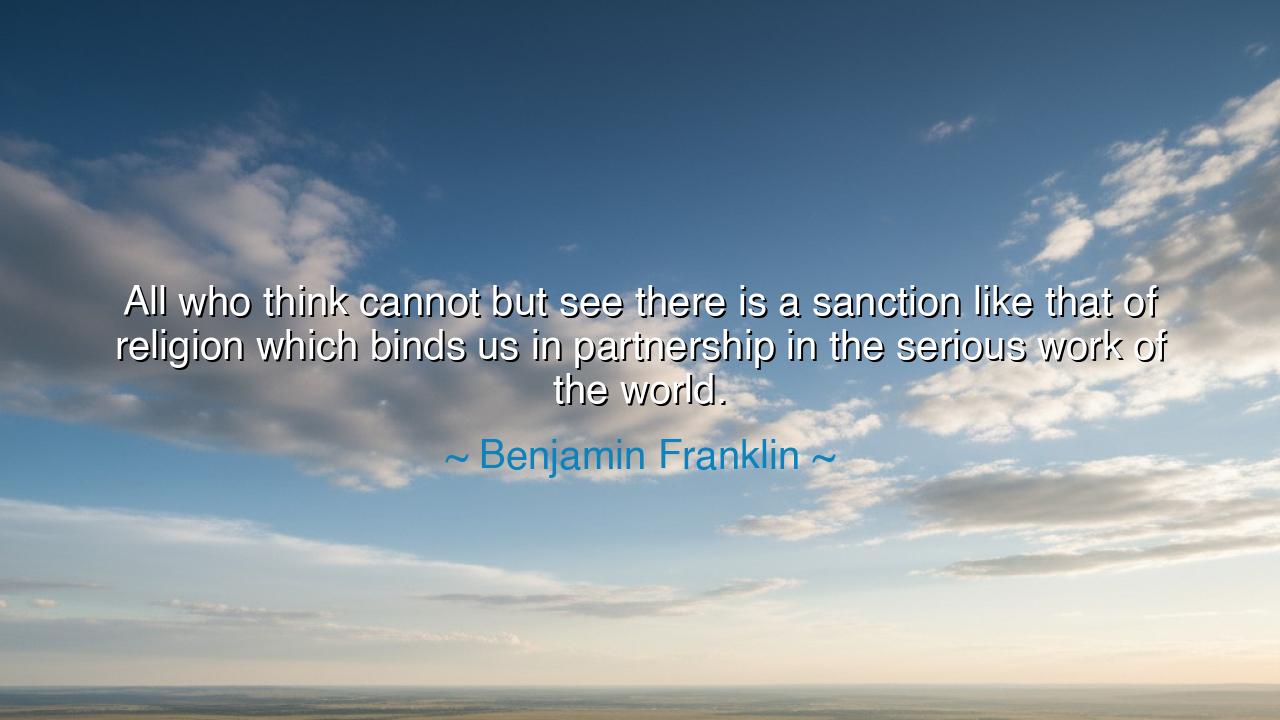
All who think cannot but see there is a sanction like that of
All who think cannot but see there is a sanction like that of religion which binds us in partnership in the serious work of the world.






In the vast tapestry of human endeavor, there exists a powerful force that binds us together in the serious work of the world—a force that calls us to transcend the limitations of our individual lives and embrace a collective purpose. Benjamin Franklin, the great statesman and philosopher, captures this truth with profound simplicity when he writes, "All who think cannot but see there is a sanction like that of religion which binds us in partnership in the serious work of the world." These words speak to a universal understanding—that in the work we do, in the pursuits that shape our lives, there is an inherent call to a higher purpose, one that unites us not just through rationality, but through a shared sense of duty and moral responsibility.
Franklin's reflection invokes the ancient notion of a divine or sacred duty that transcends individual ambition. In the ancient Greek worldview, the concept of duty was central to moral life. The stoic philosophers, like Marcus Aurelius, saw life itself as a calling to serve the common good. To them, one’s actions in the world were never separate from a higher moral law, and fulfilling one’s role in the grand cosmos was an expression of the divine order. In this sense, Franklin echoes this ancient wisdom, reminding us that there is a sanction, akin to religion, that calls us to act not solely for our own benefit but for the greater good of society—an enduring bond between all who labor in the world.
Throughout history, there have been those who exemplified this connection between individual action and shared responsibility. Consider the ancient Romans, whose society was structured around the idea of civic duty. Cincinnatus, a humble farmer who was called upon to serve as dictator in a time of crisis, embodies this idea perfectly. Rather than seeking power for his own gain, he answered the call to serve the commonwealth, knowing that his work was not just for his own glory but for the greater good of the Roman people. This sense of duty, transcending personal ambition, mirrors what Franklin spoke of—an understanding of life as a partnership, where each individual has a role in the serious work of the world.
Franklin, deeply influenced by the Enlightenment, recognized that the sanction he speaks of is not just a religious or theological one, but a moral and rational duty. This duty, however, is still bound by the same principles that religion teaches—service, compassion, and a commitment to the welfare of others. As humans, we are bound not only to our individual pursuits but to the greater good, and our actions have consequences beyond our own lives. Franklin’s vision reflects a world where reason and morality intersect with the sacred responsibility we all share to contribute to the flourishing of society.
Consider, too, the life of Mahatma Gandhi, whose actions were rooted in the belief that each person has a sacred duty to serve the world, especially in the fight for freedom and justice. Gandhi’s commitment to nonviolent resistance and his dedication to serving the Indian people was driven not merely by political ideals, but by a profound sense of moral responsibility. For him, the work of freedom was not just a political struggle but a spiritual one, and the sanction of this work was akin to a religious duty. His example shows how the call to serve the greater good is not bound by religion alone, but by the higher moral principles that unite all people in their pursuit of justice, peace, and well-being.
The lesson that Franklin offers is profound: the work we do, whether in science, politics, or any other field, is not just for our own gain. It is part of a greater moral effort—a partnership in the serious work of the world. Just as religion binds individuals to a higher law, so too does our duty to one another connect us in the shared responsibility of shaping society. In a world filled with division and strife, this unifying bond is something that transcends individual goals and reminds us of our interconnectedness. Whether we seek to heal, to educate, or to serve, our actions are sanctioned by a higher purpose, one that binds us all in the collective work of building a just and compassionate world.
In our own lives, we must recognize that our work is never purely individual. Each action we take is part of a larger whole, and it is our duty to contribute to that whole with integrity and purpose. Franklin’s insight calls us to live with awareness, to see our work not as isolated tasks, but as part of a greater moral responsibility. Whether in personal relationships, professional endeavors, or our contribution to society, we must remember that we are all bound in this partnership, and that our actions shape the world for those who come after us. Let us live with purpose, honoring the sanction that calls us to work toward the common good, with the wisdom that comes from understanding the sacred responsibility we share in this grand endeavor.






AAdministratorAdministrator
Welcome, honored guests. Please leave a comment, we will respond soon